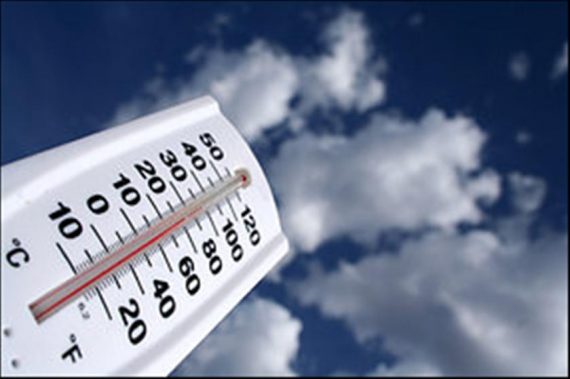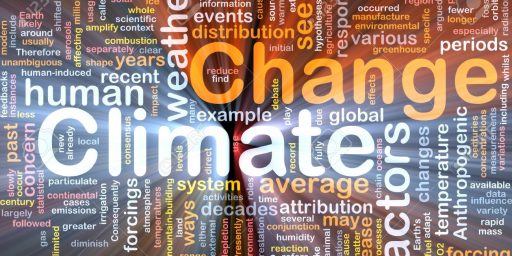Majority Concerned About Global Warming, Supportive Of Measures To Combat It
A new ABC News/Washington Post poll shows that the public is broadly concerned with the issues surrounding global warming, climate change, and the impact human activity is having on the environment:
Seven in 10 Americans see global warming as a serious problem facing the country, enough to fuel broad support for federal efforts to limit greenhouse gas emissions – even if it raises their own energy costs, a new ABC News/Washington Post poll finds.
The poll, conducted in advance of the Obama administration’s announcement today of planned regulations to cut such pollution, finds 70 percent support for limiting emissions from existing power plants, and, more generally, for requiring states to cut the production of greenhouse gases within their borders.
Notably, indicating public concern about the issue, 63 percent of Americans say they’d support a regulatory effort that significantly lowered greenhouse gases even if it raised their own energy expenses by $20 per month. (The figure is hypothetical, meant to test attitudes about the possible cost of new regulations. Actual cost impacts, if any, are a subject of sharp debate.)
Support for new regulations is linked closely to concern about the issue. Sixty-nine percent of Americans in this poll, produced for ABC by Langer Research Associates, see global warming as a serious problem; among them, eight in 10 favor new regulations, and three-quarters are willing to pay higher energy bills if it means significantly lower greenhouse gas emissions. Among those who don’t see a serious problem, by contrast, fewer than half favor cutting emissions, and just 36 percent back regulations that would raise their energy costs.
Further, among those who do see global warming – also known as climate change – as a serious problem, the vast majority, 83 percent, say it’s “very” serious.
The administration today announced plans to cut carbon pollution from existing power plants by 30 percent from their 2005 levels by 2030. States are to be given targets based on their current emissions, with flexibility on how to achieve cuts.
Interestingly, these issues are even of concern to self-described Republicans:
Despite strong political and ideological components to views on global warming, majorities across the political spectrum support new regulations, albeit to varying degrees.
Even among Republicans, a group generally more skeptical of government regulation – and less apt to see global warming as a serious problem – 63 percent nonetheless favor reducing power plant emissions, and 57 percent back state-level limits on greenhouse gases. These also are backed, respectively, by 55 and 54 percent of conservatives. (On one of these, power plant emissions, there’s a substantial gap in support between “somewhat” and “strong” conservatives.)
Support rises to eight in 10 Democrats, and peaks among liberals.
There are similar results on willingness to bear higher costs personally. Fifty-one and 44 percent of Republicans and conservatives, respectively, say they’d support efforts that significantly reduced greenhouse gas emissions but also raised their energy bills by $20 a month. That increases among independents and moderates, and tops out among Democrats and liberals.
The sharpest political and ideological divisions come on the most basic question, whether people see climate change as a serious problem or not. Eighty-four percent of Democrats do; that declines to 68 percent of political independents, and dives to 49 percent of Republicans.
Similarly, global warming is seen as a serious problem by half of conservatives overall, and just 41 percent of people who describe themselves as very conservative. That compares with 74 percent among moderates and 87 percent among liberals. (Conservatives account for a bit more than a third of the population overall; moderates for about four in 10, liberals a quarter.)
These divisions appear most sharply when comparing liberal Democrats and conservative Republicans. In the former group, 90 percent see climate change as a serious problem. In the latter group, it’s 37 percent.
The immediate conclusion to be drawn form these numbers, of course, is that the environment is an issue on which Democrats have the advantage. That’s hardly news, however, since Democrats have had the advantage on that issue for decades and it hasn’t exactly helped them in the polls. The real question, as always, is the extent to which this is an issue that will motivate people to vote for one candidate over an other, or cause them to turn out for an election that they might have otherwise stayed home for. Most polling that has shown Democrats with the advantage on this issue has also shown that it is not a high priority issue for voters. Much like gun control, it’s an issue that people feel strongly about but which may not necessarily cause them to vote for one candidate over another, or to get out to vote to begin with. That being said, polls like this should be a message to the GOP that the stick-your-head-in-the-sand position on climate change isn’t really doing them any good and that, just may not be the politically smart position for them to take on this issue.






The GOP candidates in 2012 didn’t do themselves any favors by claiming they wanted to abolish the EPA, apparently.
There are still a lot of conservatives out there, they just get drowned out by the hooligan wing.
Um, no.
Two important corrections here:
1) “The environment” is not an issue — it’s a whole raft of interrelated issues. Issues of public health, use of public resources, conservation of resources, preservation of less-developed ‘wilderness’ areas, preservation of ecosystems, relative costs and benefits of cheap energy over time, tradeoffs between present efficiency and future cleanup problems, etc. etc.
2) Global warming is not merely an environmental issue. Even people who don’t give a rodent’s rear about “the environment” should be legitimately concerned about things like water scarcity, increased regional conflict over resources, sea level change, shifting agricultural zones, droughts, and other likely consequences of global warming. Pure rational self-interest suffices; a little bit of compassion for the people who live in the places that will be hardest hit doesn’t hurt either. But none of that aligns with what you invoke when you cite “the environment” in American politics.
I would suggest that these numbers reflect that Americans have, to some extent, figure out that this is NOT about “the environment”.
Objection, assumption not in evidence. How do you know it hasn’t?
We haven’t won the popular vote against Republicans in five of the last six presidential elections for no reason, after all….
@DrDaveT:
Or, perhaps, that Americans have started to figure out that “the environment” is WHAT WE LIVE IN That the environment is WHAT KEEPS US ALIVE. It’s what enables our industrial civilization to function the way it does.
Pffft. The environment is overrated. The only important thing is the profits of donors. End of story.
@DrDaveT:
Yes to everything you wrote — in particular:
All of this is critical because these factors result in:
1. Famine
2. Mass Refugee Migration
The challenge, as you hint, is that the areas of the world that will be hit first (and arguably worst) tend to be far away from the US. So these results will be largely “invisible” to us.
We’re going to deal with the more spectacular effects (i.e. more intense – in terms of rainfall — storms) and some of the more subtle effects (i.e. loss of indigenous plant species through new diseases) long before many of the other issues. The problem is that the spectacular effects can be explained away (a “once in a generation” storm) and the subtle effects will be largely missed (or blamed on invasive species).
@Rafer Janders:
The problem is that we’ve — generally speaking — bought into a post-enlightenment (civilized/wild-man/animal) view of the world that separates us from our environment.
I’m actually not surprised at this. A huge percentage of the skepticism about global warming is about the politics. No discussion is complete until Algore or liberals are dragged out and ritually flogged. When the issue is split from the politics, I find that most conservatives, in their hearts, appreciate the potential danger of AGW and think something should be done about it.
@Matt Bernius:
The residents of Florida may not see it that way but for the most part you are correct. I think the United Nations population projections are pure fantasy. I think we have already reached “peak people” and I the world population will start to decline soon. Even in the US there is very little talk of trying to mitigate the impact of climate change. New York City is threatened by rising sea levels. The Valley of the Sun/Phoenix will be soon be a ghost town because of a lack of water. The insurance underwriters pulled out of Florida years ago and the state of Florida was forced to become the underwriter.
@Ron Beasley: I wish people would stop using anthropomorphic terms when referring to the Earth. “The Earth is sick.” No, it’s not. Even if Global Climate Change ends up raising the temperature by 20 degrees, the Earth will bumble along in its orbit until something drastic happens like a large asteroid, or the Sun grows into a red giant zillions of years from now.
It’s HUMANITY that ain’t going to survive the changes in the climate….
Who knows–maybe this is all a plot by the dinosaurs to bring back their ecology and kill off those silly small squeaking things called mammals.
@grumpy realist:
George Carlin summed this up well, riffing off the “Save the Planet” campaigns of the time:
“The planet is fine. We’re f*cked.”
@Ron Beasley:
I question the concept of New York City being truly threatened in the visible future. Or rather, that isn’t going to be a day-to-day threat. It’s the possibility that every few years, certain sections of the city will flood (as they did after Sandy).
Again, until that flooding becomes semi-regular, few people are going to be *that* concerned about it (for better or worse).
@grumpy realist:
Well, humanity and a *lot* of other species of plants, animals, and insects (who generally speaking, did very little to create the problems that will wipe them off the face of the earth).
@Matt Bernius: I’m afraid your comment about NYC applies more generally. A lot of people aren’t going to care until it affects them directly.
The same can be said about gun control and abortion.
But it’s not about the general electorate. Its all about the base.
And the Republican base is exxxxtra crazy.
People are supportive of taking measures to combat the effects of global warming as long as they do NOT have to pay for it.
A few years ago one of my clients told me not to do any more “green” ad campaigns. “Everyone wants green – until they find out it will cost them even one dollar more. Then they don’t give a shit.”
@Hal_10000: “Russian scientists prediction cooling of earth imminent” (wattsupwiththat.com)
Several sites report Russian scientists predicting cooling eras and small ice age ahead. And who would know better about cold weather than the Russians!!
I knew that things have been cooler around here! Our summers in the ’80’s were so hot the thermometers melted and sidewalks buckled ! Where was Al Gore back then?
@al-Ameda: Ding! Ding! Ding! We have a winner. You have finally discovered the other elephant in the room. Being concerned about the environment is usually something where I am concerned about how you are harming it.
Consider the story of a former colleague of mine. She was a stanch Ralph Nader supporter because “he will do something to stop people from destroying the environment.”
Her situation: well, she commuted in from 60 miles away, in a 1.5 ton pickup–with dualies–five days a week because “I simply cannot live in a big, crowded city like this one (population 30,000). My soul needs space to thrive.” She was living on a forty acre farm that she had taken out of service because “i’m too busy to care for things.” When I commented that a Nader administration that was concerned about the environment might suggest that she should live closer to her work, her response was that some people will need to be allowed to live as they choose. I assume that she was thinking that she was one of those and that I was probably not.
In Seattle, where I grew up, part of the urban sprawl problem comes from a continuous flight to more and more remote exurbs. This phenomenon has been going on there for as long as I can remember and I’ll be 62 in July.
@Matt Bernius: subsidence isn’t a big problem up there, now head south to norfolk/nola and it’s a bigger deal. it’s easier to rally up some agw folks when the land is sinking – although they seem to think the water is rising.
@Just ‘nutha’ ig’rant cracker: good point- i know some people who “think” that way. i won’t even put a political spin on it, not worth it.
@Just ‘nutha’ ig’rant cracker:
I hear you loud and clear.
I used to live in an inner-burb in the San Francisco Bay Area and about 25 years ago I moved to what used to be a somewhat isolated country town about 60 miles from San Francisco, and now it’s a country suburb (an exurb, if you will.) Mileage-wise what I did was the equivalent to moving from Ballard in Seattle to Olympia. Quality of life matters and commuting 4.5 hours a day, even if it is to-and-from a nice place, is not necessarily a good quality of life choice.